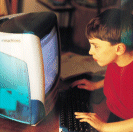
THE HOMEWORK DEBATE
When is it just too much?
Just because homework is familiar, is it necessarily desirable? Is homework an effective learning tool, or merely a substitute for classroom work?


|
THE HOMEWORK DEBATE When is it just too much? Just because homework is familiar, is it necessarily desirable? Is homework an effective learning tool, or merely a substitute for classroom work? |
|
By Philippa Davies It’s 11:40 in the morning and Jane and her mother are barricaded in their cosy kitchen for the duration. Eight-year-old Jane, seated at the table, collapses over a pile of books and papers. The math workbook, open at page 21, reads, “You have 36 sides altogether, made up of an equal number of squares and ....” Jane lets out a sob, her shoulders heave up and down. Her mother, Sara, barely pauses as she lifts the next cookie from the baking tray to the cooling rack. They’ve been at it since 9:00 and Jane hasn’t finished the first page. Sara and Jane wonder if they’re the only ones doing homework this Saturday morning. Most kids get homework, and many fret over it. We all had homework to do as kids. But now some educators, researchers and parents are questioning whether some students are getting too much homework. Jane’s older sister, now in Grade 5 at the same central Toronto school, is bringing home two to three hours of homework a night. “We wonder if we’re just not being efficient,” Sara confides, “but I finally broke down and spoke to other parents, and they are facing a similar situation. It’s hard when both parents are working, and we also want to give the girls the opportunity to explore other extracurricular interests, like music or Guides. You start to wonder, where is the down time?” Jack, a seven-year-old just starting Grade 1, shares an apple fruit roll-up with his father, Mark, as they hunch over the purple and gold covered storybook. “And … I’ll … puff … and … I’ll … puff … and … I’ll ... b … b … b … bl …” Mark deliberately bites his tongue. “Blow!” shouts Jack triumphantly. Father and son laugh happily. “I enjoy this time with Jack,” says Mark, a father of three who works from home. “But sometimes it is a strain, when I have a deadline, and my wife is away on a business trip and the two older boys have projects to do. There’s a lot of stress, a lot of nerves.” Back in Sara’s kitchen, Jane has five more pages to go. So far the family has done no groceries; the dog is wearing a track across the carpet as she paces back and forth. “I would love it if the children could be outside all day, but this just isn’t possible.” Sara smiles hesitantly.
G R O W I N G A T T E N T I O N Sara is not alone in her feeling that perhaps there are better ways for young children to spend their free time than in doing homework. Over the last two years, articles in the National Post, The New York Times and Time Magazine have expressed a wave of concern over homework. The Times reported on the Piscaway school district in New Jersey, which last fall limited the amount of homework to be sent home to 30 minutes a night for elementary school and formally discouraged the assignment of homework on weekends. No similar measures have been taken by any of the large Ontario school boards, although several have homework policies, among them, the Toronto District School Board (TDSB) and Durham District School Board. Durham’s advice on homework encourages parents to have a positive attitude toward homework: “Homework is time with your child. Make it a part of every day.”  Individual schools will often have homework policies, even if their boards do not. The Near North District School Board has nothing at board level, but many schools may have their own guidelines. The Lakehead Board of Education does not actively promote a homework policy, but among the schools in the region, Nor’wester View and Five Mile schools propose their own policies which call for no extra assigned school work to be given to students below Grade 5.
Similarly, the Conseil des écoles publiques de l’Est de l’Ontario (CEPEO) has no clear guidelines, but individual schools have in some cases strict rules regarding the completion of homework. This French board commented, however, that the issue is currently under review at the board level and new policies may apply to all schools in the board in the near future.
Individual schools will often have homework policies, even if their boards do not. The Near North District School Board has nothing at board level, but many schools may have their own guidelines. The Lakehead Board of Education does not actively promote a homework policy, but among the schools in the region, Nor’wester View and Five Mile schools propose their own policies which call for no extra assigned school work to be given to students below Grade 5.
Similarly, the Conseil des écoles publiques de l’Est de l’Ontario (CEPEO) has no clear guidelines, but individual schools have in some cases strict rules regarding the completion of homework. This French board commented, however, that the issue is currently under review at the board level and new policies may apply to all schools in the board in the near future.
F O C A L P O I N T The End of Homework, published in August 2000 by Beacon Press, has become a focal point in the debate over homework. Authors John Buell and Etta Kralovec – both teacher educators at the College of the Atlantic – captured media and popular attention, and stimulated discussion in the press by questioning the legitimacy of traditionally held views on the value of homework. As Suzanne Ziegler pointed out in her 1986 research report on homework for the Toronto Board of Education, “parental involvement in their children’s schooling is strongly and positively associated with children’s achievement.” But a significant amount of recent research shows no conclusive evidence that homework itself contributes to academic success at the elementary school level. Harris Cooper, professor of psychology at the University of Missouri-Columbia and one of the leading authorities in the field in North America, says that recent research confirms earlier findings. “In the upper-level elementary school grades, there was no relation between time on homework and achievement.” Yet surveys show that teachers are giving more and more homework. A University of Michigan study published last year shows that while six to nine-year-olds spent 44 minutes per week on homework in 1981, in 1997, they spent over two hours. The Toronto District School Board recommends 10 to 30 minutes of homework per day most evenings for K-3. But Jane’s weekly assignments, handed out on Friday and due on Monday, are taking her up to six hours to complete. Jack, in Grade 1, is spending at least half an hour per night reading. Clearly not all Toronto teachers are following the TDSB guidelines. By one o’clock, Jane has brightened up a little. She pushes the blue notebook labeled “math” aside and pulls a red folder marked “spelling” from a tottering pile of books and papers. Her mother sighs quietly with relief.
T O O M U C H T O D O Some teachers say it is getting harder to stick to the recommended number of homework hours. They say they have not yet had time to adjust to the new material they are required to cover following the implementation of the new curriculum in September 1999. For Jane and other Grade 3s, new province-wide testing has added to the challenges facing teachers. Many say they are sending more work home, either to help cover the curriculum or to meet the higher demands for student output under the new curriculum. Beverley Conner, a teacher at Arlington Middle School, also in Toronto, has noticed that she has been giving more homework lately. “Increased pressure and increased accountability in the school system mean I need more product from students,” she says.  David Booth, a professor in the Curriculum, Teaching and Learning department at the Ontario Institute for Studies in Education at the University of Toronto (OISE/UT), also finds that the new curriculum is putting strains on the system that can result in more homework, and more importantly, homework which is not well thought out.
Harris Cooper notes that parents’ demands also figure in this equation. He warns that some of the concern over the increased amount of homework may be exaggerated. A U.S. poll in October 2000 showed that only 10 per cent of parents thought their kids were getting too much homework.
David Booth, a professor in the Curriculum, Teaching and Learning department at the Ontario Institute for Studies in Education at the University of Toronto (OISE/UT), also finds that the new curriculum is putting strains on the system that can result in more homework, and more importantly, homework which is not well thought out.
Harris Cooper notes that parents’ demands also figure in this equation. He warns that some of the concern over the increased amount of homework may be exaggerated. A U.S. poll in October 2000 showed that only 10 per cent of parents thought their kids were getting too much homework.
P A R E N T A L B A C K L A S H Cooper sees these parents as part of a vocal minority who have demanded high standards and challenges for their children to meet their own high social and economic goals. Ironically, these are often the same parents who were pushing for more homework in the past. “There is now a backlash amongst these parents who feel resentful about the amount of time that has to be spent helping children with their homework,” he says. At the same time, Cooper does not dismiss the concerns over homework, especially for children who can not get much help at home. “For disadvantaged children, (homework may) create frustrating situations that are detrimental to learning.” In The End of Homework, Kralovec and Buell argue that homework can in fact foster social inequities. The authors stress that children do not all go home to the same environment. Some kids are greeted by enthusiastic parents with books on hand to research or enhance the topic under discussion; others go home to a negative or at best distracting situation.
D O I T A T S C H O O L ? Even parents with strong academic backgrounds themselves are feeling the strain when demanding jobs for both parents outside the home run up against increased demands from the school in the form of more and more homework. Buell and Kralovec have a solution. “If we all need a quiet well-lit place to study, far away from the TV, we would like to suggest that we know a perfect spot that precisely meets those requirements: the schoolhouse.”  Jane’s 10-year-old sister, legs curled under her in the wide brown plush armchair, looks up from her book expectantly as the grandmother clock chimes 2:00. The little Border collie sets up a low persistent whine. Sara has the grilled cheese and tomato sandwiches on plates on the counter, but the kitchen table needs to be cleared. There sits Jane, her elbows on her books pushing her fist across her face and smearing it with tear-marks.
Otto Weininger, professor emeritus in the Early Childhood Education Department at OISE/UT, is concerned about the demands on children beginning earlier and earlier. “I am seeing considerable resentment amongst parents, starting with children at the Kindergarten level, over homework. This resentment can lead to conflict between parent and child, with deleterious effects on the child’s long-term academic progress.”
Jane’s 10-year-old sister, legs curled under her in the wide brown plush armchair, looks up from her book expectantly as the grandmother clock chimes 2:00. The little Border collie sets up a low persistent whine. Sara has the grilled cheese and tomato sandwiches on plates on the counter, but the kitchen table needs to be cleared. There sits Jane, her elbows on her books pushing her fist across her face and smearing it with tear-marks.
Otto Weininger, professor emeritus in the Early Childhood Education Department at OISE/UT, is concerned about the demands on children beginning earlier and earlier. “I am seeing considerable resentment amongst parents, starting with children at the Kindergarten level, over homework. This resentment can lead to conflict between parent and child, with deleterious effects on the child’s long-term academic progress.”
David Booth also doesn’t like to see the increase in the amount of homework without any clear philosophy behind it. He wants to see homework used more effectively. Often teachers simply send home the work that has not been completed in class. “I would like to see homework be a curriculum course in schools, with clear, thoughtful objectives.” He has proposed a course on homework at OISE/UT. But he warns that progress is slow. “In any of the care-giving professions, change is a delicate process.” In the meantime, poorly thought-out or inappropriate homework can add to the frustrations and negative feelings that many children and their families have expressed. “Repetitive, unmeaningful practice results in nothing but negative attitudes to schools and learning. I hate homework,” says Booth. At 5:00 o’clock, the homework is finished, at least for today. Jane is lying flat out on the floor rubbing her head into the dog’s beige and white silken fur. The battle over homework is over. But who has won? Sara sounds carefully ambivalent. “Of course homework comes first, but we do feel as a family a little bit cheated if the weekend goes by and all we’ve done is clean the house and do homework,” she says with a small smile. Jane looks up from the carpet; her smile mirrors her mother’s. After all, tomorrow is Sunday. For more information on the Toronto and Durham boards’ homework policies, visit www.tdsb.on.ca/boardroom/policies/d/d03.htm and www.ddsb.durham.edu.on.ca . |
|
From the Chair | Registrar's Report | Remarkable Teachers | Blue Pages News | Reviews | Calendar | Netwatch | FAQ | Letters to the Editor Ontario College of Teachers 121 Bloor Street East, 6th Floor Toronto ON M4W 3M5 Phone: 416-961-8800 Toll-free: 1-888-534-2222 Fax: 416-961-8822 http://www.oct.ca info@oct.ca |